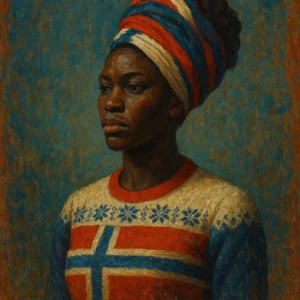They Want Our Rhythm, but Not Our Presence
HISTORY, 3 Nov 2025
Raïs Neza Boneza – TRANSCEND Media Service
For all the stolen names, and those who still rise.
21 Oct 2025 – There were twelve thousand ships. Twelve thousand vessels that crossed the Atlantic, carrying twelve and a half million Africans to the Americas. And yet, I grew up knowing the names of the Mayflower and the Titanic—sometime luxurious symbols of migration and tragedy, carefully preserved in the Western imagination. But I could not name a single one of those twelve thousand ships that carried my ancestors.
The White Lion, The Leusden, The Meermin, The Clotilda. The Neptunus. The La Amistad. Ships of empire, of commerce, of human suffering. Vessels of the Dutch West India Company—the Hasselt, Coromandel, and Hazenburg to name a few. Each one a floating grave.
An estimated 1.8 million Africans died during the Middle Passage alone. These were not deaths of war, not acts of God, but deliberate sacrifices to the machinery of profit. And yet, their stories are erased. Were these chapters of history forgotten—or erased on purpose?
One of the slave ships was named after Jesus as well. Probably that the reason when our ancestors sang of “returning to Jesus,” perhaps they were not invoking salvation—but home.
For those who remained in Africa, and for those who were scattered by the tide, the question remains: How do we reconnect the broken circle?
To be Black is to live in exile everywhere, even in one’s own skin. Because no matter where you go, a version of the same wound awaits.
In Brazil, the blackest country outside Africa, police will kill the folk with impunity. In the UK, you can speak the Queen’s English and still be told to “go back to Africa.” In France, racism hides behind the mask of “secularism,” banning headwraps and natural hair in the name of neutrality. In China, Black students were expelled from housing during COVID simply for being African. In India, fetishization and violence coexist on the same street. In Ukraine, white refugees were welcomed aboard trains while Black refugees were barricaded at borders. The middle-east can be an abusive or death trap for melaninated people And in Libya—yes, in 2025—Black bodies are still being sold.
The Atlantic slave trade never ended; it merely changed costume or get upgraded. Today, it lives in wage gaps, immigration policies, and the quiet violence of neglect.
The world has a complicated relationship with Blackness. It desires our rhythm but rejects our presence. It celebrates our culture while denying our humanity, rob us and erase our achievement.
They’ll wear dreadlocks on runways but ban them in classrooms. They’ll chant Wakanda Forever and scream racial slurs at the next Black athlete. They’ll romanticize the “Black aesthetic”—the music, the slang, the movement—but not the people who created it.
Blackness is loved, but not protected. Seen, but never safe.
Aimé Césaire once wrote that colonization dehumanizes even the colonizer. It corrupts the soul that learns to forget. Today’s world suffers from that same sickness—a global amnesia that erases the violence that built modernity.
But we remember. Our story did not begin with slavery, nor end with survival. We are the children of kingdoms, the descendants of creators, philosophers, and dreamers. Our survival is not a miracle—it is a rebellion.
Even scattered from Accra to New-Orleans, from London to Kingston, from Paramaribo to The Hague , from the wintry Scandinavia landscapes to Port-au-Prince Haiti—we are still here. Still creating. Still connecting. Still becoming whole again.
The moment we stop letting borders and languages divide us; the moment we recognize one another not as fragments but as family—that is the moment we become healed.
Because Black history is not a footnote. It is the foundation. It is human history.
____________________________________________
 Raïs Neza Boneza is the author of fiction as well as non-fiction, poetry books and articles. He was born in the Katanga province of the Democratic Republic of Congo (Former Zaïre). He is also an activist and peace practitioner. Raïs is a member of the TRANSCEND Media Service Editorial Committee and a convener of the TRANSCEND Network for Peace Development Environment for Central and African Great Lakes. He uses his work to promote artistic expressions as a means to deal with conflicts and maintaining mental wellbeing, spiritual growth and healing. Raïs has travelled extensively in Africa and around the world as a lecturer, educator and consultant for various NGOs and institutions. His work is premised on art, healing, solidarity, peace, conflict transformation and human dignity issues and works also as freelance journalist. You can reach him at rais.boneza@gmail.com – http://www.raisnezaboneza.no
Raïs Neza Boneza is the author of fiction as well as non-fiction, poetry books and articles. He was born in the Katanga province of the Democratic Republic of Congo (Former Zaïre). He is also an activist and peace practitioner. Raïs is a member of the TRANSCEND Media Service Editorial Committee and a convener of the TRANSCEND Network for Peace Development Environment for Central and African Great Lakes. He uses his work to promote artistic expressions as a means to deal with conflicts and maintaining mental wellbeing, spiritual growth and healing. Raïs has travelled extensively in Africa and around the world as a lecturer, educator and consultant for various NGOs and institutions. His work is premised on art, healing, solidarity, peace, conflict transformation and human dignity issues and works also as freelance journalist. You can reach him at rais.boneza@gmail.com – http://www.raisnezaboneza.no
Tags: Africa, Anglo America, Black Culture, Black History, Black Lives Matter, Latin America Caribbean, Slavery, USA
DISCLAIMER: The statements, views and opinions expressed in pieces republished here are solely those of the authors and do not necessarily represent those of TMS. In accordance with title 17 U.S.C. section 107, this material is distributed without profit to those who have expressed a prior interest in receiving the included information for research and educational purposes. TMS has no affiliation whatsoever with the originator of this article nor is TMS endorsed or sponsored by the originator. “GO TO ORIGINAL” links are provided as a convenience to our readers and allow for verification of authenticity. However, as originating pages are often updated by their originating host sites, the versions posted may not match the versions our readers view when clicking the “GO TO ORIGINAL” links. This site contains copyrighted material the use of which has not always been specifically authorized by the copyright owner. We are making such material available in our efforts to advance understanding of environmental, political, human rights, economic, democracy, scientific, and social justice issues, etc. We believe this constitutes a ‘fair use’ of any such copyrighted material as provided for in section 107 of the US Copyright Law. In accordance with Title 17 U.S.C. Section 107, the material on this site is distributed without profit to those who have expressed a prior interest in receiving the included information for research and educational purposes. For more information go to: http://www.law.cornell.edu/uscode/17/107.shtml. If you wish to use copyrighted material from this site for purposes of your own that go beyond ‘fair use’, you must obtain permission from the copyright owner.
Join the discussion!
We welcome debate and dissent, but personal — ad hominem — attacks (on authors, other users or any individual), abuse and defamatory language will not be tolerated. Nor will we tolerate attempts to deliberately disrupt discussions. We aim to maintain an inviting space to focus on intelligent interactions and debates.
